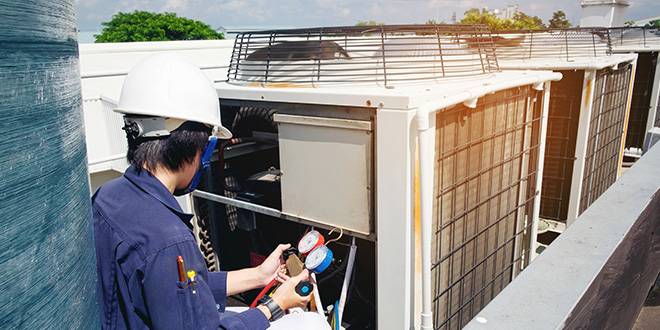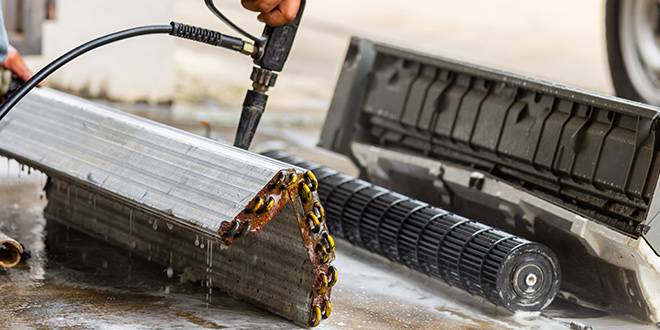Why Knowing Your AC’s Fuse Status is Crucial in Tulsa, OK
In the sweltering heat of Tulsa, OK, a functioning air conditioner isn’t just a luxury—it’s a necessity. That’s why understanding the health of your air conditioning unit, especially its fuses, is crucial for maintaining a comfortable and safe environment. At Cartwright Heat & Air, we know firsthand how frustrating and uncomfortable it can be when your AC suddenly stops working. Knowing how to tell if an AC fuse is blown can save you time and discomfort, ensuring your home stays cool during the hottest days.
In this guide, we’ll walk you through the signs of a blown AC fuse, how to check it, and what steps to take if you find an issue. Our aim is to empower you with the knowledge to identify this common AC problem quickly and effectively.
For more detailed service information and how we can assist you further, visit our detailed service pages for Tulsa, Broken Arrow, Bixby, and other nearby areas.
Understanding Your AC Unit

Key Components of Your Air Conditioner
Whether you’re cooling a small home or a large commercial space in Tulsa, it’s important to know a bit about the different types of AC systems and the role fuses play in keeping them running smoothly. Here’s a quick breakdown of common AC systems in the area and the critical function of fuses within these systems.
Types of AC Systems
- Central Air Conditioning: Most common in residential and commercial buildings, these systems cool your entire property through a network of ducts.
- Split Systems: Ideal for heating and cooling individual rooms without ductwork, offering efficient temperature control and lower installation costs.
Role of Fuses in AC Units
Fuses are safety devices designed to protect your air conditioning system from electrical issues. They are typically found in the outdoor compressor unit and act as a fail-safe, cutting power if the current flowing through the circuit becomes too high. This prevents damage to the motor and other components that could be costly to repair.
Understanding the basic setup and function of your AC system, including the crucial role of fuses, can help you better identify issues and communicate more effectively with HVAC professionals.
For those interested in exploring more about the types of AC systems we service, you can find specific details on our dedicated service pages for Claremore, Glenpool, and Jenks.
Common Signs of a Blown AC Fuse
Identifying Potential Issues Early
When it comes to keeping your air conditioning system in top shape, recognizing the early signs of a blown fuse can prevent more serious problems down the road. Here are some key indicators that your AC fuse might be blown:
- AC Unit Won’t Turn On: One of the most straightforward signs of a blown fuse is when the AC unit fails to start despite being properly set on the thermostat.
- Frequent System Resets: If your air conditioning system is frequently tripping the circuit breaker or requires constant resets, this could be a sign of an overloaded fuse.
- Noises from the AC Unit: Unusual sounds such as buzzing or humming from the AC unit can indicate electrical issues that may include a blown fuse.
Understanding these signs can help you quickly address fuse-related issues before they escalate into more costly repairs. Remember, if you notice any of these symptoms, it’s crucial to consult with a professional to safely and accurately diagnose and fix the problem.
For top-quality AC repair services and preventive maintenance to help avoid such issues, explore our services in areas like Owasso, Sapulpa, and Skiatook.
Next, we’ll provide a detailed step-by-step guide on how to safely check if an AC fuse is blown, ensuring you can confidently assess your system’s status.
Step-by-Step Guide to Checking an AC Fuse
Safely Inspecting Your AC’s Electrical Components
Before you start inspecting your air conditioner’s fuse, it’s essential to prioritize safety. Here’s a simple, step-by-step guide to help you safely check if your AC’s fuse is blown:
Tools You’ll Need:
- Non-contact voltage tester
- Insulated gloves
- Safety goggles
Steps to Check an AC Fuse:
- Turn Off Power: Ensure your safety by completely turning off power to the AC unit at your circuit breaker.
- Locate the Fuse Box: Typically, the fuse box is located in or near the outdoor compressor unit. Consult your AC’s owner’s manual if you are unsure.
- Inspect the Fuses: Carefully remove the fuse box cover. Use your non-contact voltage tester to confirm there is no live electricity present. Look for fuses that are discolored, cloudy, or visibly damaged.
- Test the Fuses: If the fuses appear intact but you suspect a problem, test each fuse with a multimeter set to the continuity setting. A blown fuse will show no continuity.
- Replace if Necessary: If a fuse is blown, it must be replaced with a new one that matches the exact specifications required by your AC unit. This is critical to ensure safety and proper functioning.
Important Safety Tip:
Always replace fuses with the exact type specified by the manufacturer to avoid any risk of fire or damage to the AC system. If you are unsure or uncomfortable with replacing a fuse yourself, it’s wise to contact a professional.
At Cartwright Heat & Air, we are here to help you with all your AC maintenance needs, ensuring that your system is always running safely and efficiently. For further assistance or to schedule a repair, feel free to contact us or visit our service page for residential air conditioning.

Next, let’s look at what to do if you discover that your AC fuse is indeed blown.
What to Do If Your AC Fuse is Blown
Immediate Steps to Ensure Safety and Repair
Discovering a blown fuse in your AC unit can be concerning, but taking the right steps can help mitigate any further issues. Here’s what you should do if you find that an AC fuse is blown:
- Turn Off the AC Unit: Immediately switch off the AC unit at the thermostat and the main power supply to prevent any additional damage.
- Do Not Attempt DIY Repairs: While it might be tempting to try and fix the issue yourself, handling electrical components can be dangerous without the proper training and tools.
- Contact a Professional: Reach out to experienced HVAC professionals who can safely replace the fuse and inspect the system for any underlying issues that may have caused the fuse to blow.
Why Professional Help is Crucial:
- Diagnosing the Root Cause: A professional can determine if the blown fuse was a symptom of a larger issue, such as an electrical fault or an aging AC unit.
- Ensuring Correct Installation: They can ensure that the correct type of fuse is used and that it’s installed properly, which is essential for the safety and efficiency of your AC system.
- Comprehensive System Check: Besides replacing the fuse, a technician will also check other components to ensure everything is functioning correctly and safely.
At Cartwright Heat & Air, we understand the urgency and the inconvenience of an AC breakdown, especially during the hot months in Tulsa. We are committed to providing prompt and reliable service to get your system back up and running smoothly. For quick and efficient service, visit our AC repair page or contact us directly for assistance.

In the next section, we’ll share tips on how to prevent future AC fuse issues, helping you maintain a reliable and efficient air conditioning system.
Preventing Future AC Fuse Issues
Maintaining Your Air Conditioner for Longevity and Efficiency
Preventative maintenance is key to ensuring that your air conditioning system remains reliable and efficient, minimizing the chances of experiencing a blown fuse. Here are some proactive steps you can take to keep your AC running smoothly:
- Regular Maintenance Checks: Schedule regular professional inspections and maintenance to ensure your AC unit is in top condition. This includes cleaning, checking for adequate refrigerant levels, and ensuring electrical connections are tight and secure.
- Clean and Replace Air Filters Regularly: Dirty air filters can cause your AC to work harder than necessary, leading to overheating and potential fuse problems. Check and replace your air filters every 1-3 months, depending on usage and environmental factors.
- Ensure Proper Airflow: Keep the area around your outdoor compressor unit clear of debris, leaves, and other obstructions to maintain good airflow. Inside your home, make sure vents are not blocked by furniture or curtains.
- Upgrade Aging Systems: Older AC systems are more prone to issues like blown fuses. Consider upgrading to a newer, more efficient model if your system is showing its age. This can save you money and headaches in the long run.
- Use Surge Protectors: Power surges can cause fuses to blow. Using surge protectors can help shield your AC and other appliances from sudden spikes in electricity.
Benefits of Professional Maintenance:
- Efficiency: Regular maintenance keeps your AC running as efficiently as possible, which can reduce your energy bills.
- Longevity: Proper care can significantly extend the life of your AC unit.
- Peace of Mind: Regular checks can prevent unexpected breakdowns and costly repairs.
At Cartwright Heat & Air, we offer comprehensive AC maintenance services to help you avoid common issues like blown fuses. By investing in regular maintenance, you ensure that your AC system stays robust and reliable, especially during the demanding summer months in Tulsa and the surrounding areas.
Stay Cool with Confidence
Take control of your comfort with Cartwright Heat & Air! Whether it’s expert repair, proactive maintenance, or a new installation, we’ve got you covered. Contact us today to ensure your AC is always in top shape and ready to handle Tulsa’s heat. Let’s make your next summer the coolest yet!








